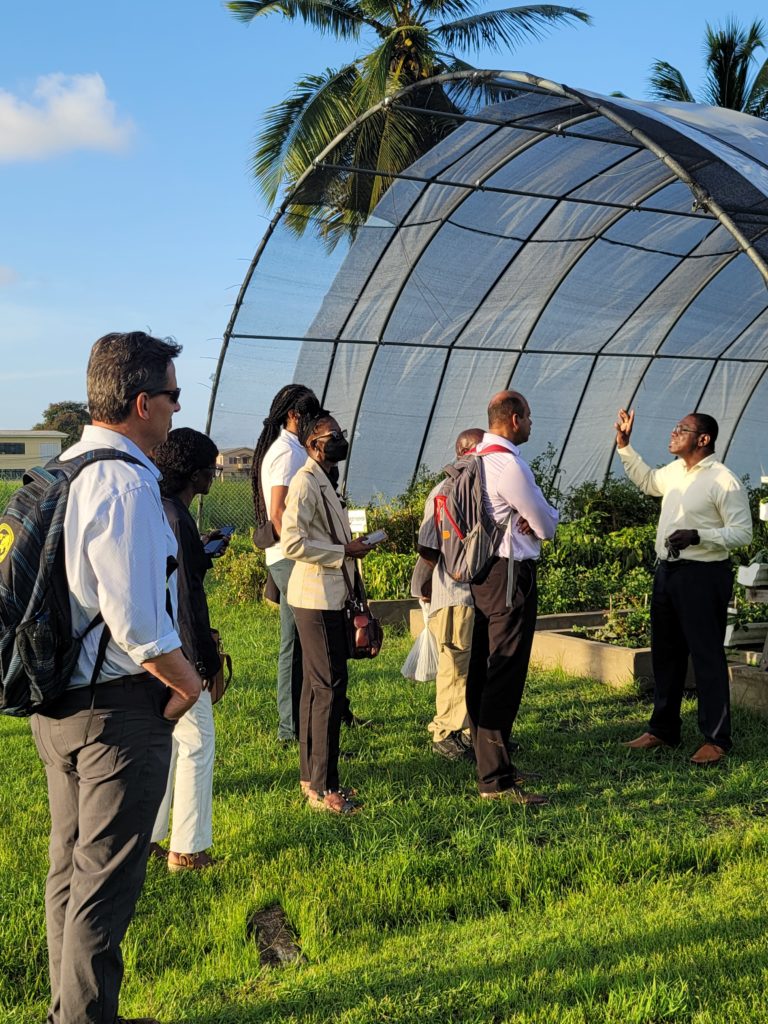
A team of scientists and stakeholders traveled to Guyana on May 30 – June 5, 2022, to engage the industry, government, and private and public sectors in quinoa’s value chain. The U.S. delegation included professors from the University of Maryland Eastern Shore (UMES), Brigham Young University (BYU), Central State University (CSU), and representatives from the Foundation Felix Quinoa Farming Industry Inc. (FQFI). UMES was represented by Drs. Sadanand Dhekney and Stephan Tubene. While Dr. Rick Jellen represented BYU, CSU was represented by Drs. Michelle Corley and Ibrahim Katampe. Representatives from FQFI were Ms. Joan Perry, Ms. Clavelle Francis, Mr. Russell Felix, and Mr. Winston Felix.
Steps to ensure the establishment of a sustainable quinoa value chain in Guyana were debated by the U.S. delegation as a part of preliminary fact-finding for the consultative meetings. Primary observations concluded there was a lack of adequate quinoa seed stock and inadequate seed storage conditions in Guyana. Other constraints along the quinoa value chain included production challenges, processing, and marketing challenges and opportunities. Due to the shortage of seeds, one would argue a quinoa breeding program must be established by interested stakeholders including the University of Guyana (UOG), the National Agricultural Research and Extension Institute (NAREI), and the U.S. universities (BYU, VSU, CSU, and UMES). In addition, the Guyana government (i.e., Ministry of Agriculture (MOA)) would certainly be involved by facilitating the establishment of needed infrastructure, including the importation of seeds, the creation of a seed repository, and the permanent availability of seeds to the producers.
Prior to the U.S. delegation’s departure to Guyana, Ms. Joan Perry, Felix Quinoa Farming Industries Inc.’s founder, CEO and president, initiated contact with the Guyana stakeholders to investigate their availability. A trip itinerary was established and approved by the U.S. delegation and Guyana stakeholders. The U.S. delegation then traveled to Georgetown, Guyana, on the weekend of May 28-29, 2022. Consultative meetings were held May 30-June 5, 2022, as scheduled.
The purpose of the Guyana consultative meetings was to explore challenges and opportunities facing the quinoa value chain in Guyana. The specific objectives included: 1) learning what has been accomplished regarding the cultivation of quinoa in the country; 2) engaging various stakeholders along the quinoa value chain from input to the consumers’ table; and 3) exploring ways and means to move forward the quinoa value chain.
The U.S. delegation met with the following entities: Ministry of Agriculture (MOA), National Agricultural and Research Institute (NAREI), University of Guyana (UOG), U.S. Embassy, Caribbean Research and Development Institute (CARDI), Inter-American Institute for Cooperation on Agriculture (IICA), Food and Agriculture Organization (FAO), Guyana Rice Development Board (GRDB), and Berbice’s smallholder farmers.

While the first two objectives were accomplished, the third and most essential commands attention from all parties involved.
“We have a very diverse and strong team of scientists from UMES, VSU, CSU, and BYU. BYU brings quinoa germplasm, international quinoa introduction experience, and a network of international scientists connected to quinoa production and breeding, especially at low elevations,” said Dr. Jellen of BYU. “We also bring quinoa genomic tools and bioinformatic skills (especially Drs. Jeff Maughan and David Jarvis) for student training within the project. The FQFI team (Ms. Joan Perry, Ms. Claville Francis, Mr. Winston Felix, and Mr. Russell Felix) brings local knowledge, energy, field resources, in-country networks, and the ability to recruit farmers to work on the project.”
Suitable growing environments and match selections to those environments need to be found. Sandy loam soils will most likely prove suitable for sustainable quinoa production in Guyana. However, the partnership with NAREI and UOG, as well as Mahendra Prasad at GRDB, will be critical. The sandy savanna soils in Region 9 are likely where the first large-scale trials should be put out.
A mechanized and small-scale, but scalable, desaponification solution for Guyanese quinoa producers must be identified. Then needed is the ability to distribute that apparatus throughout the country.
The above is a synopsis of Guyana consultative meetings, additional information may be obtained by writing to the Center of Excellence for Global Food Security and Defense – cegfsd@umes.edu

